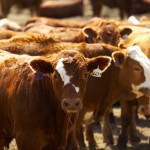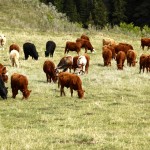
Tag Archives Beef Cattle Research Council

Bovine respiratory disease from the farm to the feedlot
Research on the Record with Reynold Bergen
Weed seeds and invasive species may be present even in well-managed pastures and rangelands, but it is hard for them to germinate, establish and spread in healthy, competitive forage stands. Stresses like severe drought, overgrazing, heavy traffic or excavation can weaken forage stands and create opportunities for unwanted plants to take root. Researchers are now […] Read more

Karen Schwartzkopf-Genswein receives 2017 Canadian Beef Industry Award
Lethbridge researcher presented with Outstanding Research and Innovation award at Canadian Beef Industry Conference
A nationally and internationally respected researcher of beef cattle health and welfare has been awarded the 2017 Canadian Beef Industry Award for Outstanding Research and Innovation. Karen Schwartzkopf-Genswein, PhD, was honoured Aug. 17 at the 2017 Canadian Beef Industry Conference. Dr. Schwartzkopf-Genswein is a Senior Research Scientist at Agriculture and Agri-Food Canada in Lethbridge, Alta., and holds […] Read more

Native forages offer resilience against Mother Nature
Long-lived native forages complement tame forages nicely — but they have their own merits that make them more competitive than their tame counterparts
Native forages are making a comeback with cattle feeders who are looking for a way to work with — not against — Mother Nature. “Native species complement tame forages,” said federal research scientist Alan Iwaasa. “When used with tame species, native species have merit and can be used quite effectively if you have the land […] Read more

Facts about antimicrobial resistance
While the industry is already doing a good job, there is ongoing room for improvement
There have been volumes written on antimicrobial resistance (AMR) in the last several years. And it is important to remember just how good the Canadian cattle industry is doing in managing AMR and look to future changes veterinarians may make in their recommendations. For those of you craving more detailed information, there have been several […] Read more

It’s that anthrax time of year
Animal Health: News Roundup from the June 2017 issue of Canadian Cattlemen
Anthrax spores can lurk in soil for decades and there’s no telling where the disease will pop up from year to year. All it takes is something that brings spores to the surface and the stage is set for an outbreak in cattle that happen to ingest them. Predicting when anthrax will occur in Canada […] Read more

Should you preg check your cows?
News Roundup from the May 2017 issue of Canadian Cattlemen
Really, should you preg check? That’s a question almost everyone in the cow business faces every fall. The advice from governments and veterinarians is generally yes, you should find out if the cows you are going to carry through the winter will give you a calf at the end of it. So why did 50 […] Read more
New president for Canadian Meat Council, new inductees for Sask. Agricultural Hall of Fame
NewsMakers from the May 2017 issue of Canadian Cattlemen
Chris White is the new president and CEO of the Canadian Meat Council. He comes to the council with 20 years experience in government and industry relations as chief of staff for five federal cabinet ministers and vice-president of government relations in the finance, insurance, and auto sectors. The Canadian Meat Council represents 400 federally […] Read more
Comment: Ontario banks on branding
It was near the end of the Beef Farmers of Ontario (BFO) meeting and Sylvain Charlebois, the well-known food researcher from Dalhousie University was wrapping up his talk on changes in consumer buying habits. One final questioner asked him if he had any suggestions for the best way to convince consumers of the value of […] Read more

Stepping up to wheat-based finishing diets in cattle
Research on the Record with Reynold Bergen
Grain-based diets improve feed efficiency, but increase the risk of rumen acidosis. Rumen acidosis occurs when rumen pH drops below 5.6 for more than three consecutive hours. Severe or chronic acidosis is an animal welfare concern due to rumen damage, liver abscesses, lameness, and an economic cost due to compromised feed conversion and growth performance. […] Read more

Facing up to pain in cattle
Meloxicam brings comfort to cattle and producers
No ifs or buts about it, producers who used meloxicam to ease the discomfort of branding, castration and other routine procedures on young calves in the past plan to use it again this spring. Meloxicam is a non-steroidal anti-inflammatory drug (NSAID) to reduce inflammation, pain and fever, and fortunately Canadians now have three long-acting meloxicam […] Read more



